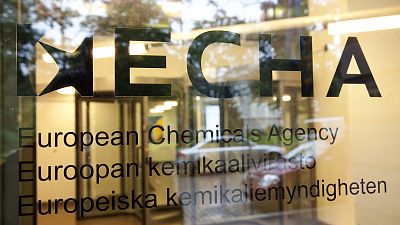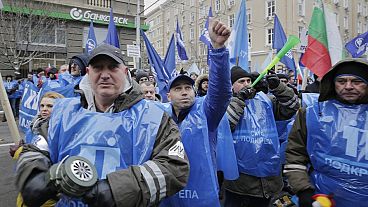Forever chemicals are the 'health scandal of the century’ on the same level as asbestos, say French politicians.
Products containing PFAS or ‘forever chemicals’ could soon face tight restrictions in France.
The first draft of a bill banning certain products containing the harmful chemicals was approved unanimously by the National Assembly on Thursday.
It particularly targets the manufacture, import and sale of cosmetics, clothing and ski wax containing PFAS.
French politician and environmentalist Nicolas Thierry, who introduced the bill, hailed the decision a “huge victory in the recognition of the health scandal of the century,” adding, “This vote is historic.”
However, some products - including Tefal pans - were struck from the bill following industry lobbying. Manufacturers said a ban would put thousands of jobs at risk. Protective clothing for safety workers is also excluded from the ban.
What is PFAS?
PFAS stands for per- and polyfluorinated substances, a family of around 10,000 substances. These human-made chemicals are often referred to as ‘forever chemicals’ because they don’t break down in the environment.
Thanks to their non-stick, waterproof or stain repellent properties, they are commonly used in textiles, food packaging and kitchen products.
As well as damaging the environment, forever chemicals have been linked to cancer, low birthweight and hormonal dysfunction, among other health issues. They have been found everywhere from rainwater to breastmilk.
Discussing the ban on TV show Les 4 vérités, French politician and economist Sandrine Rousseau warned that forever chemicals are “a scandal of the same order as asbestos”, the notorious building material that was banned in the EU in 2005 due to its carcinogenic properties.
When could France’s PFAS ban come into effect?
France could begin restricting products containing non-essential PFAS from January 2026. The ban could be extended to all textiles by 2030.
The bill also includes a ‘polluter pays’ principle, which would see manufacturers charged for the clean up of chemical contamination of drinking water.
But the exclusion of Tefal pans and other kitchen utensils from the ban, based partly on lobbying from kitchenware manufacturer SEB, has disappointed environmental campaigners.
“The sacrifice of individual and collective well-being on the altar of financial interests and sacrosanct competitiveness must stop,” French politician Clémentine Autain wrote on X.
Will PFAS be banned in the EU?
In January 2023, a joint proposal to ban PFAS was presented to the EU by Denmark, Germany, the Netherlands, Norway and Sweden - all of which have strong internal rules on PFAS.
But EU plans leaked in October appeared to quietly omit the proposal from a list to be brought forward ahead of this year’s European parliament elections, UK newspaper The Guardian reported.
In March this year, the EU gave the greenlight to ban PFHxA, a subgroup of forever chemicals used in food packaging and clothing. The restrictions will be phased in over the coming three years.
A general ban on PFAS in food packaging and toys is expected, though industrial uses have been notably omitted from restrictions so far.
Maximum concentrations of PFAS in water have already been set and will apply from January 2026, and a proposal to restrict the chemicals in firefighting foams has gained backing from the European Chemicals Agency (ECHA).
In 2020, Denmark became the first country to ban PFAS chemicals. Last year, the US also proposed placing limits on forever chemicals.



